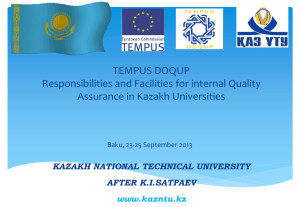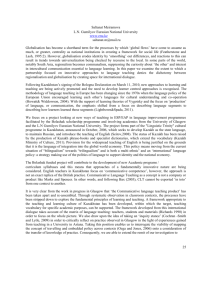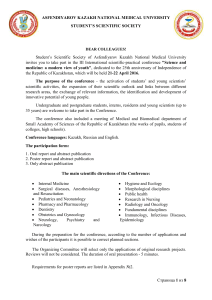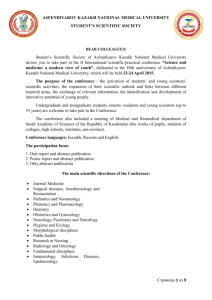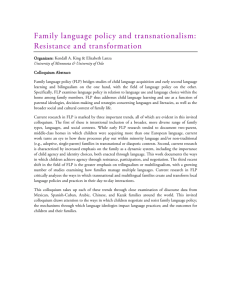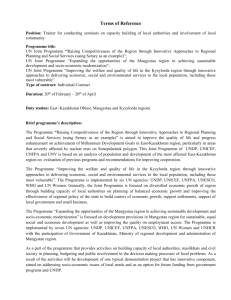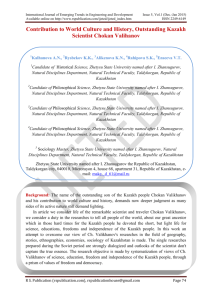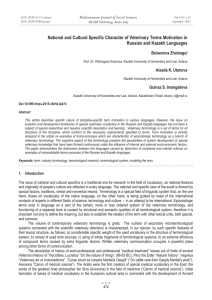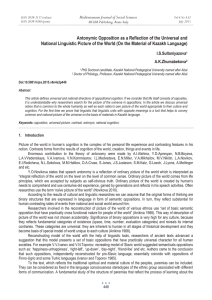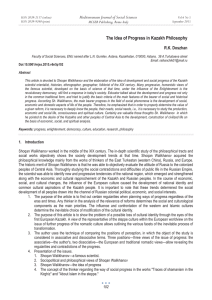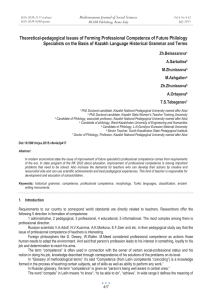Формирование и развитие бизнес-терминов в - G
advertisement
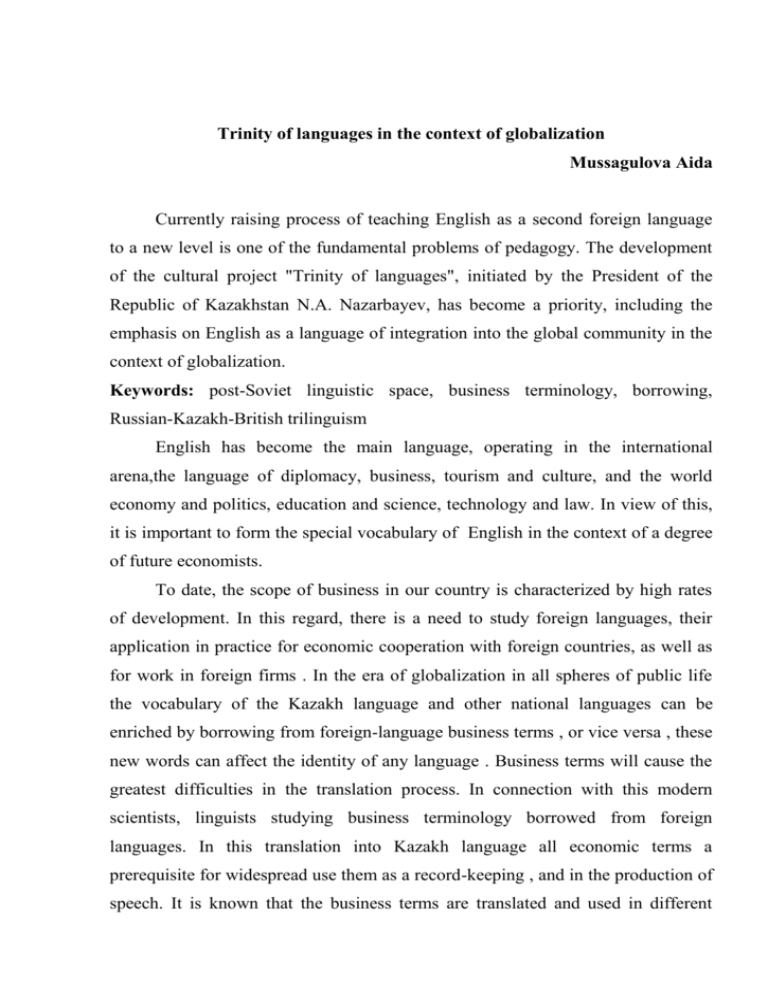
Trinity of languages in the context of globalization Mussagulova Aida Currently raising process of teaching English as a second foreign language to a new level is one of the fundamental problems of pedagogy. The development of the cultural project "Trinity of languages", initiated by the President of the Republic of Kazakhstan N.A. Nazarbayev, has become a priority, including the emphasis on English as a language of integration into the global community in the context of globalization. Keywords: post-Soviet linguistic space, business terminology, borrowing, Russian-Kazakh-British trilinguism English has become the main language, operating in the international arena,the language of diplomacy, business, tourism and culture, and the world economy and politics, education and science, technology and law. In view of this, it is important to form the special vocabulary of English in the context of a degree of future economists. To date, the scope of business in our country is characterized by high rates of development. In this regard, there is a need to study foreign languages, their application in practice for economic cooperation with foreign countries, as well as for work in foreign firms . In the era of globalization in all spheres of public life the vocabulary of the Kazakh language and other national languages can be enriched by borrowing from foreign-language business terms , or vice versa , these new words can affect the identity of any language . Business terms will cause the greatest difficulties in the translation process. In connection with this modern scientists, linguists studying business terminology borrowed from foreign languages. In this translation into Kazakh language all economic terms a prerequisite for widespread use them as a record-keeping , and in the production of speech. It is known that the business terms are translated and used in different ways or transferred by half, and often transmitted through transliteration (ie, not translated ). Typically, business terms consist of one, two or more words. Translator experiencing considerable difficulty in translating the terms consisting of several words, finding their conceptual equivalents in the other language and transfer values. Because the integral value of such combinations should not be of meanings of their individual words. On the basis of the interaction of complex phrases meanings some words lose their basic meaning and are used in a figurative, thereby forming a new concept . It is impossible not to take into account all the above facts in the translation of this kind of complex phrases. Equivalent translation of the words that make up these phrases , in most cases clears the basic idea . In addition, it is known that the translation from English into Russian or Kazakh changing the order of words in phrases , and their case endings , as a result of the data combinations are formed, respectively, the system and the characteristics of each language . [1] In this regard, the science of language there are new directions. "The use of language in the communication process is considered a pragmatic linguistics. This has been recognized not only linguistic relations, but also the language objects and communication processes. If the former linguistics in the study of languages is the text of the proposal, the word and its grammatical forms, the pragmatic linguistics participates as a speaker, the listener, the writer and the reader needs, objectives, practical and communicative human activities"[2]. The present society of our country adheres to an ideology trilinguism . This calls for business correspondence in three languages. But, unfortunately, in the conduct of business documentation, record keeping, there were shortcomings and gaps. Therefore, in most cases, the terms are not translated, resulting in use of two or more consecutive words borrowed. According to B.H.Hasanov, the experience of bilingualism in a multiethnic state helps to eliminate the language barrier, the development of economic and business relations of any society. In order to be among the first to have a fairly deep knowledge of market relations, and is considered an important strategy for the use of language and communication policy. Bilingualism is one of the areas of language strategy area of government and commerce.[3] B.K.Ayapbergenov notes that bilingualism (Kazakh, Russian, Kazakh, English, Russian, English) is used in external advertisements, ads, advertising boards, posters, bulletin boards, etc. For example: trading house – торговый дом, магазин; продукты -products, bilingualism is used in the names of products, such as power tools Black Decker, salon Leonardo. [4] A.M. Omergalieva writes: "The business terms through the manipulation of language has a direct impact on the consumer. In the Kazakh commercials used beautiful, mysterious names. Through visual relationships can affect the consumer's mind and character, which contributes to its purchase of this product” [5]. S.A. Asanbayeva studying sociolinguistics, focuses on the use of the Kazakh language in the visual and advertising information. According to her, in the field of advertising there is no control, advertising texts do not correspond to the norms of the Kazakh language. As an example, a large number of incorrect translation of business terms [6]. The first need of the Kazakh-British terminological dictionaries. There are several Kazakh-Russian terminological dictionaries for record keeping, "RussianKazakh terminology dictionary office (Musabekov G.T., Suleimenova B.A.), 1992"; “New titels”( Aldasheva A., Sarybaev Sh., Ualiev N.), 1992; Social- political terms and titles of Kazakh glossary of record keeping and documentation, 1994”; M.Kasymbekov, K.Alimkulov. Office of bilingualism – Almaty 1994.; Examples of office work, 1996; Сollection of terms. 1972-1988. Approved the terms. Astana 1998; Russian-English English-Russian dictionary of terms. Astana 2000.[2]. Currently, the terms in the Kazakh language are found in all walks of life. In banking, a lot of terms borrowed from other languages , in particular, Russian and English. Borrowed terms are subject to the laws of the Kazakh language and undergo morphological , phonetic and syntactic changes. For example, the terms action , the currency , the bank , the check is not translated. Many of the terms of the Kazakh language borrowed from the Russian language, in turn , these terms have come to the Russian language from other languages. In the 20's of last century in the Kazakh language has been a rapid increase in borrowing . Borrowed terms do not have translations, therefore underwent some phonetic and spelling changes. For example: ярморка (fair), генерал (general) etc. Then was formed major lexical fund of the Kazakh language, borrowed the term is used without orthographic and morphological adaptations. Comparing the banking system of the Republic of Kazakhstan and other countries, we can master the English terminology , choose the right Kazakh equivalent of the English terms . Most of the business terms are Greek and Latin roots , in this case, you should pay attention to the history of the language, the etymology of terms and their interpretation. "Kazakh language vocabulary is greatly enriched by borrowing from other languages. Significant changes in the social and public spheres and sectors of the economy and technology in the country contributed to the development and promotion of the Kazakh language. Loan words in the lexicon of the Kazakh language require careful study. The process of borrowing foreign words due to extra linguistic factors. These are: the expansion of international cooperation, the changes in the socio-political life of the country, the process of globalization, integration into the world economy"[3]. From the above it can be concluded that: the translation of foreign-language terms does not correspond to the values of industry professionals. In the process of forming an independent state key role played by the State language. The development of the state language should be based on state support and care. The share of the state language in proceedings must be absolute. All government officials and employees are required to know the state language. The Assembly of People of Kazakhstan should make an effective contribution to the development and promotion of the state language, to promote the development of the state language policy of ethnic groups living in Kazakhstan. Article 4 of the Law "On languages in the Republic of Kazakhstan" states: "It is the duty of every citizen of the Republic of Kazakhstan is to master the national language, is an important factor in the consolidation of the people of Kazakhstan." Our main task - to develop the state language by actively using it in all areas. Literature 1.Functioning and developing of languages. ˗ Report of programme of “Sovereign Kazakhstan”. ˗ Almaty.2003 2. Omarova J.K. Languages of the peoples of foreign countries (English) diss. ... 10.02.22. ˗ Almaty: Kazakh University international Relations and World Languages Ablay Khan, 2007. ˗ P.133. 3. .Hasanov B.H. Kazakh-Russian bilingualism .Alma-ata. Science. 1987. ˗ p.196. 4. .Ayapbergenov B.K. Social and linguistic problems in the functioning of the state language in the marketing area of Kazakhstan. Diss. Almaty ... 10.0219 ˗ 2004: The University "Turan-Astana", 2004. ˗ P.177 5.Omergalieva A.M .The problems of linguistic manipulation in advertising / / The problems of socio-economic and political modernization of the transit legal society. Astana. 2004. ˗ p.252 6.Asanbeva S.A. The main sociolinguistics problems of using Kazakh in advertising. Synopsis for a PhD thesis. ˗ Almaty,1999-32p.

